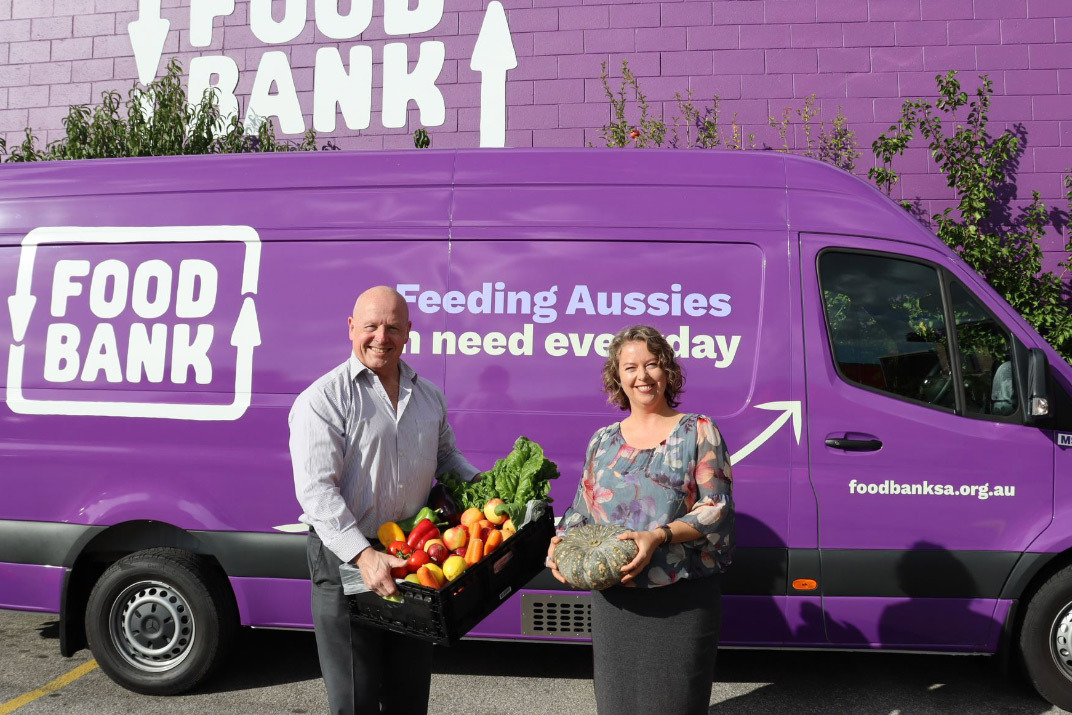- 5.5 million Australians run out of food every year, with charities struggling to meet the rising demand particularly for healthy fresh foods. At the same time, mountains of food are being wasted, costing the Australian economy $36.6 billion a year.
- The Centre for Social Impact at Flinders University has been awarded $1 million in federal funding for a new research project to transform currently wasted harvest surplus into nutritious shelf-stable products for the food-relief sector.
- Partnering with Foodbank SA and Green Industries SA, the project will design a social enterprise model to help meet the demand for healthy plant-based foods in the food-relief sector, while creating opportunities for recipients to volunteer and gain skills that increase their employability and reduce social isolation.

A new project turning surplus fresh food into nutritional meals for people most in need will launch with $1 million of federal funding, supporting an innovative social enterprise model to help tackle food insecurity in South Australia.
The Australian Research Council has announced the prestigious Industry Fellowship grant for Professor Svetlana Bogomolova , Deputy Director at the Centre for Social Impact at Flinders University. She will work in close collaboration with project partners - Foodbank SA and state government agency Green Industries SA.
The project will develop and trial a social enterprise model to meet the soaring demand for nutritious fruit and vegetable shelf-stable foods among people who are struggling to buy quality food in mainstream supermarkets. Importantly, it will use harvest surplus from the farm gate and food supply chain while also creating volunteering and skill building opportunities for food relief recipients.
Professor Bogomolova said the Centre for Social Impact proposal addressed two major problems for Australia: food insecurity, which is on the rise, spurred by risng cost of living; and food waste, both at the farm gate and in supply chains.
"With more than 5 million Australians struggling to afford food, this new model will offer timely solutions for a growing number of people while also tackling waste in the food industry," she said.
"Fruit and vegetables are currently in short supply for food relief, with the bulk of donated foods coming from supermarkets and tending to be unhealthy packaged foods. By working directly with growers and suppliers, we can improve the nutritional quality of food relief and provide a strong ongoing supply of plant-based shelf stable foods like soups, sauces, juices, pre-made meals and meal ingredients.
"A critical part of the project is to move beyond short-term food relief, by empowering people who rely on food relief on a pathway out of poverty and food insecurity, by supporting them with training and tools to open up job possibilities and improve their social connectedness."
Food waste costs the Australian economy $36.6 billion a year. One-third of two-parent families and 37% of single-parent families have experienced severe food insecurity in the last year, skipping meals or going whole days without eating.
Foodbank SA, the key industry partner on this project, is the largest food relief distributor in South Australia, supplying more than 600 charities. It is often challenged by the unpredictable amounts of fresh fruit and vegetable donations, which causes distribution challenges of this highly perishable produce, often resulting in food waste.
Foodbank SA and Central Australia CEO Greg Pattinson said the organisation was excited to explore ways to transform donated fruit and vegetable harvest surplus into shelf-stable nutritious products, using manufacturing methods (e.g. canning, freezing, pureeing and juicing) to meet the demand for healthy food year-round.
"Demand for food relief is at record levels, but the bulk of what is donated unfortunately tends towards packaged goods which don't provide great nutritional value," Mr Pattinson said.
"All families want to provide the best quality food for their children. Access to fresh and healthy foods shouldn't be limited by how much money you have, and this project can make a huge difference in helping nutritious meals get on the table for people who need financial support."
State government agency Green Industries SA, the Centre for Social Impact's other partner in the project, has responsibility for organic waste.
The collaboration will see the new model shared with Foodbank and Green Industries SA's networks, improving practice in Australia and beyond to improve nutrition for food-relief recipients, reduce harvest waste and increase opportunities for people in vulnerable situations, bringing longer-term social benefits.






